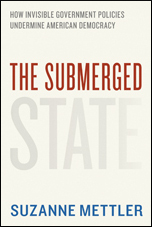 This time of year folks compile their year-end reading lists; so as we head into the holiday week, with pension debates and fiscal cliffs waiting for us on the other side of the calendar, I wanted to offer some suggestions:
This time of year folks compile their year-end reading lists; so as we head into the holiday week, with pension debates and fiscal cliffs waiting for us on the other side of the calendar, I wanted to offer some suggestions:
The first is a just released paper from Steven M. Teles, Associate Professor of Political Science at Johns Hopkins University, called, Kludgeocracy: The American Way of Policy . In it he describes the highly dysfunctional, and intentionally confusing policy approach developed in the last 30 years. Here is a sample:
“The price paid by ordinary citizens to comply with programmatic complexity is the most obvious downside of kludgeocracy. One of the often overlooked benefits of Social Security, for example, is that recipients silently have taxes taken out of their paycheck and then, without any effort on their part, checks begin to magically appear upon retirement.
By contrast, 401(k)s, IRAs, 529 plans and the rest of our crazy quilt of savings incentives (for retirement as well as other purposes like higher education) require enormous investments of time, effort and stress. Just for a start, equity mutual funds charge an annual fee of around one percent of assets — compounded until retirement, this reduces savings by around twenty percent.2 Including items beyond the management fee (like transaction costs and the reduced returns that come from having to hold cash to deal with redemptions), can push that number up considerably.”
One of the books mentioned by Teles is the phenomenal “The Submerged State: How Invisible Government Policies Undermine American Democracy, by Suzanne Mettler. Released at the end of 2011, Mettler details how ( in my words) we are giving up on democracy because it is too damn hard. We are using the tax code instead of policy and programs, the buy off various interest groups. She writes:
“As a result, this large portion of the submerged state, which not many Americans realize is subsidized by Government, showers benefits for more generously on the haves than on the have-nots.…
From 1980 until the current recession, the core sector that it nurtures – finance, insurance, and real estate- outpaced growth in other sectors of the American economy. The fortunes of these industries emanated not from “market forces” alone but rather from their interplay with the hidden policies that promoted their growth and heaped extra benefits on them.”
And speaking of taxes, the report that the Republicans tried to kill is finally out! The Congressional Research Service report : Taxes and the Economy: An Economic Analysis of the Top Tax Rates Since 1945 looks at just that, tax rates on the elite to see how they affected the economy and guess what?
“The results of the analysis in this report suggest that changes over the past 65 years in the top marginal tax rate and the top capital gains tax rate do not appear correlated with economic growth. The reduction in the top statutory tax rates appears to be uncorrelated with saving, investment, and productivity growth. The top tax rates appear to have little or no relation to the size of the economic pie. But as a small proportion of taxpayers are affected by changes in the top statutory tax rates, this finding is not unexpected.
However, the top tax rate reductions appear to be correlated with the increasing concentration of income at the top of the income distribution. As measured by IRS data, the share of income accruing to the top 0.1% of U.S. families increased from 4.2% in 1945 to 12.3% by 2007 before falling to 9.2% due to the 2007-2009 recession. At the same time, the average tax rate paid by the top 0.1% fell from over 50% in 1945 to about 25% in 2009. The statistical analysis in this report suggests that tax policy could be related to how the economic pie is sliced—lower top tax rates may be associated with greater income disparities.”
So how does all this happen? How does our policy making get stolen and turned into a transfer of wealth from the working class to the 1% ? How does the consulting class take over? How do the “trickle down theorists” keep getting any media air time despite report after report proving their theory is as credible as dinosaurs still walking the Earth? How do so many people in media and the so called “liberal class” fall for such bad ideas like “pension reform” or “education reform” ?
“Inferring the Popularity of an Opinion From Its Familiarity: A Repetitive Voice Can Sound Like a Chorus” is a wonderful social science study from Kimberlee Weaver, Stephen M. Garcia and Norbert Schwarz, and Dale T. Miller. They write:
Despite the importance of doing so, people do not always correctly estimate the distribution of opinions within their group. One important mechanism underlying such misjudgments is people’s tendency to infer that a familiar opinion is a prevalent one, even when its familiarity derives solely from the repeated expression of 1 group member.…
…..the present studies convey an important message about how people construct estimates of group opinion, namely that observers appear to infer information about extensity, or the range of group members supporting an issue, from their subjective experiences of familiarity for an opinion position. To the degree that our impressions of what others think influence our own perceptions of reality, the present studies can help inform us about the repetition effect and its consequences.
There are lessons to be learned here. See you in 2013. Don’t forget to sign up for Leadership for a Future.

